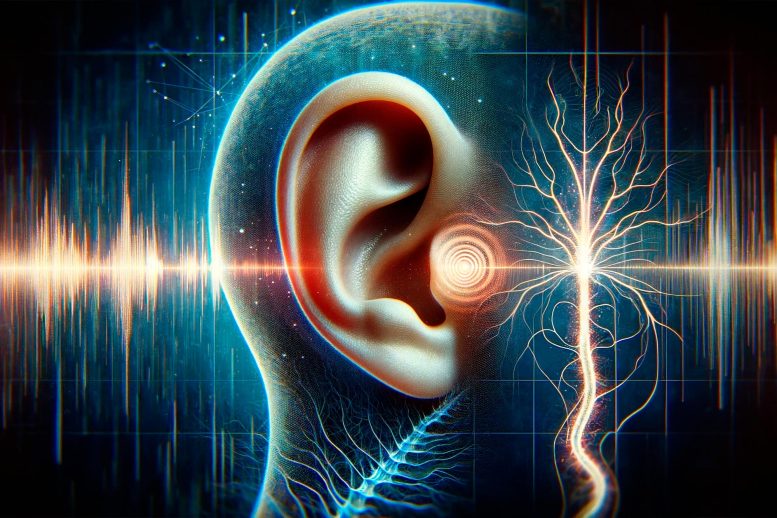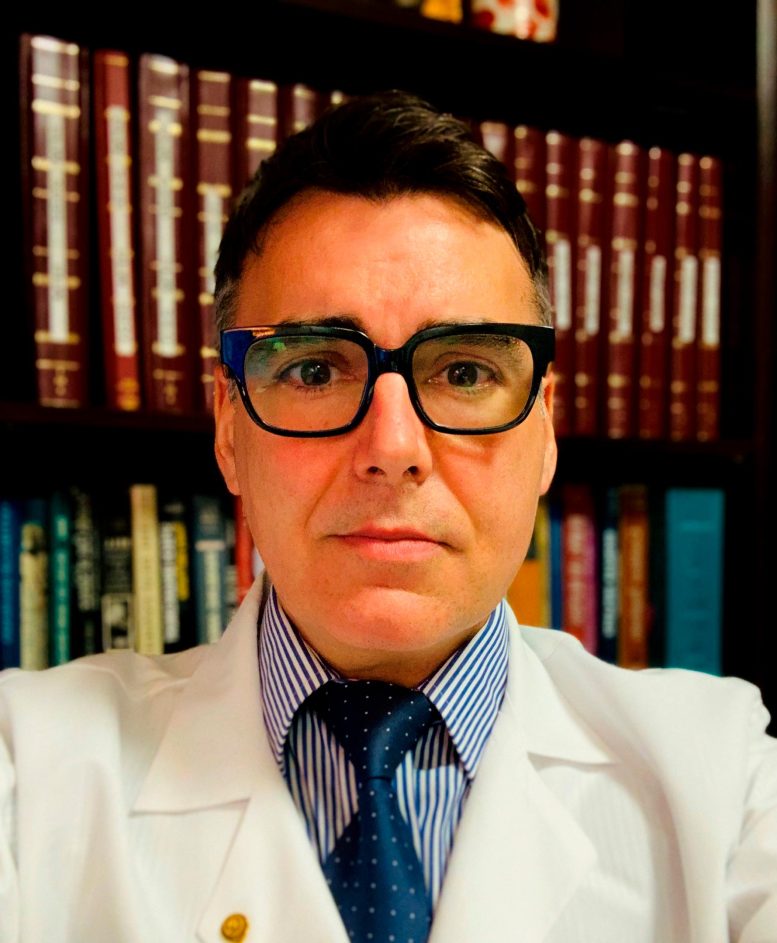
Researchers at Mass Eye and Ear have linked tinnitus, a condition affecting over 10% of adults worldwide, to undetectable auditory nerve loss. Their study suggests that even individuals with normal hearing tests can suffer from this hidden hearing loss, paving the way for new treatments focused on nerve regeneration.
A groundbreaking study by Mass Eye and Ear associates tinnitus with undetected auditory nerve damage, challenging previous beliefs and opening new paths for treatment through auditory nerve regeneration.
A new study from Mass Eye and Ear investigators reveals that people who report tinnitus, which presents as a ringing in the ears in more than one out of ten adults worldwide, are experiencing auditory nerve loss that is not picked up by conventional hearing tests. This work is part of a P50 grant awarded by the National Institutes of Health (NIH) to Mass Eye and Ear researchers within the Eaton-Peabody Laboratories (EPL) for their work on cochlear synaptopathy, which is commonly referred to as “hidden hearing loss.” The results from this study provide a better understanding of the origins of tinnitus and are published today (November 30th) in the journal Scientific Reports.
Impact of Tinnitus on Quality of Life
“Beyond the nuisance of having persistent ringing or other sounds in the ears, tinnitus symptoms are debilitating in many patients, causing sleep deprivation, social isolation, anxiety and depression, adversely affecting work performance, and reducing significantly their quality of life,” said senior author Stéphane F. Maison, PhD, CCC-A, a principal investigator at Mass Eye and Ear, a member of Mass General Brigham, and clinical director of the Mass Eye and Ear Tinnitus Clinic. “We won’t be able to cure tinnitus until we fully understand the mechanisms underlying its genesis. This work is a first step toward our ultimate goal of silencing tinnitus.”
Rethinking Tinnitus and Hearing Loss

Stéphane F. Maison, PhD, CCC-A, an investigator at Mass Eye and Ear’s Eaton-Peabody Laboratories, and clinical director of the Tinnitus Center at Mass Eye and Ear. Credit: Mass Eye and Ear
Many individuals with hearing loss report a buzzing, humming, ringing, or even roaring sound in their ears. It’s been a longstanding idea that these symptoms, known as tinnitus, arise as a result of a maladaptive plasticity of the brain. In other words, the brain tries to compensate for the loss of hearing by increasing its activity, resulting in the perception of a phantom sound, tinnitus. Until recently though, this idea was disputed as some tinnitus sufferers have normal hearing tests.
However, the discovery of cochlear synaptopathy back in 2009 by Mass Eye and Ear investigators brought back to life this hypothesis as it was evidenced that patients with a normal hearing test can have a significant loss to the auditory nerve. In view of this paradigm shift in the way researchers and clinicians think about hearing loss, Maison and his team sought to determine if such hidden damage could be associated with the tinnitus symptoms experienced by a cohort of normal hearing participants. By measuring the response of their auditory nerve and brainstem, the researchers found that chronic tinnitus was not only associated with a loss of auditory nerve but that participants showed hyperactivity in the brainstem.
Towards a Potential Cure for Tinnitus
“Our work reconciles the idea that tinnitus may be triggered by a loss of auditory nerve, including in people with normal hearing,” said Maison.
In terms of future directions, the investigators aim to capitalize on recent work geared toward the regeneration of auditory nerve via the use of drugs called neurotrophins.
“The idea that one day, researchers might be able to bring back the missing sound to the brain and, perhaps, reduce its hyperactivity in conjunction with retraining, definitely brings the hope of a cure closer to reality,” Maison added.
Reference: “Evidence of cochlear neural degeneration in normal-hearing subjects with tinnitus” by Vasilkov, V et al., 30 November 2023, Scientific Reports.
DOI: 10.1038/s41598-023-46741-5
Funding: This work was supported by a grant from the NIDCD (P50 DC015857) and the Lauer Tinnitus Research Center at the Mass Eye and Ear.









I hope you find help for use.
Please continue your research and find a cure for tinnitus. It is debilitating!
Please continued with the research because it now frustrating a lot
I developed Tinnitus from my enlistment in the Navy (Naval Boiler Tech) and it has
plagued me ever since. My Audiologist at the VA Hospital says that they are working
on the problem, so this article looks promising. I find that listening to good Jazz
Music helps as a distraction from the loud noise in my ears. You might try music as
well. I only hope that it will not take surgery to solve the problem; as I do not
believe that I would do surgery in my ears. We will see what the future holds.
Thank you for the idea to listen to JAZZ to distract the attention from the tinnitus. I use a medium size air filter in our bedroom and it has a wonderful moderate loud white noise that distracts me from the tinnitus rining so I can get to sleep at night.
In 1986, I took Excedrin throughout 1 day for menstrual cramps – the maximum allowed as indicated on the label, and within 24 hours, I had ringing in my ears that has never subsided. I was 19 years old. I am now nearly 57, and it is the worse it has ever been, drowning out sounds around me. This has plagued me my entire adult life. It wouldn’t surprise me if the percentage of people suffering from tinnitus is much, much higher than 10%.
I used VISINE eye wash 4 x day 1985-1990 until Docs told me DO NOT USE VISINE and that it was very potent dangerous at those quantities. Recently read that it may be taken off the shelf for it’s dangerous components.
Today I have tinnitus and loss of smell and taste since early 1990s. I wonder if there might be similar chemicals in Visine and Excedrin that affects the cillia in our noses connected to our brain and eyes.
I think this author has some marbles mixed; OK let’s say it is true that auditory nerve damage has a part in causing tinnitus. What does it have to do with cure? Neurotrophins make them grow back? Good luck in curing tinnitus that way. Hearing loss? This has multiple components: auditory hair cells damage, let’s say, 98% of cases (I do not know the number, maybe our author knows), OK auditory nerve, also auditory center in the brain, and a few more connections here and there we don’t know squat about these. So please stop spewing nonsense about curing tinnitus or, almighty forbid, hearing loss. Personally, I have a bad hearing loss, likely from the loss of the damn hair cells, and I would be more than happy to have conventional normal hearing and the world’s worst tinnitus. The findings they talk about are glorious but not that useful in these contexts. I demand an apology.
Tinnitus Tale: A LONG time ago (roughly 70 Years, I’m now 80.) I frequently “messed around” with firecrackers. The first time I remember ringing in my ears was after one nearly went off in my ear when I was attempting to throw it. (It went off inches from my head … it scared me but didn’t cause any other noticeable physical damage except for a constant ringing/screaming in my ears and short lived tingling in my hands). Of course, I have long ago discontinued such “messing around”. As I think back, my ears have been constantly ringing ever since. I have functioned more or less normally throughout my life, and have had normal … possibly even better than normal … hearing acuity; but , as I say, a constant very high “screaming”. Mostly, of course, I have ignored it, (I thought everyone had this) but I’d give a great deal if I could banish it for the remainder of my life and have some actual “quiet”. Is there any chance of this? Would love to have your thoughts and input and would be willing to be the subject of any tests you may wish to perform. My information is available below. I would greatly appreciate your input.
Please find a way to correct single sided deafness.
I once took to much asprin, i became pretty ill. The ringing in my ears was crazy. I have heard seniors who are on multible medications complain of this often and they are usually taking some form of aspirin to thin their blood, so i think their bodies are over saturated with that or other drugs. Also some folks are sensitive to geo-electrical impulses. It doesn’t always have to be a complicated answer but i guess it keeps the funding rolling.
I also have 15 percent hearing loss in right side due to a viral infection as a child. Hearing guy said. I do remember having the mumps on my right. I get the ringging once in awhile and they say “right for spite” and ” left for love”
I hope that this research does lead to something effective. I’ve been plagued by severe tinnitus since my teens (now 45) and having found nothing to work in all these years, a new research direction is music to my ringing ears!
It is a shame that our medicine is still incapable of curing tinnitus and hearing loss. Unfortunately, human hearing is the most neglected and overlooked sense organ in medical research. No wonder we still don’t have a cure. Audiology and otology have made zero progress in the last decades. I think that a cure for tinnitus and hearing loss will belong to the field of regenerative medicine. Under current circumstances, we will probably have to wait decades, if not centuries, until a cure is found. There is simply not enough research being done. It seems like the medical profession isn’t interested in finding a cure. Completely complacent, the medical profession believes that hearing aids and habituation are sufficient to treat tinnitus and hearing loss. Patients are not taken seriously and are sent home with statements like “learn to live with it” or “we can’t do anything for you.” In the 21st century, mind you! Tinnitus and hearing loss are conditions that affect millions of people, but nothing is being done to end the suffering. There is not enough research and there is a lack of awareness. Only a few research institutions worldwide conduct research. One can count them on both hands. The big pharmaceutical companies are not involved at all. Anyone who believes that research is being carried out around the clock for a cure is wrong. That’s not the case!